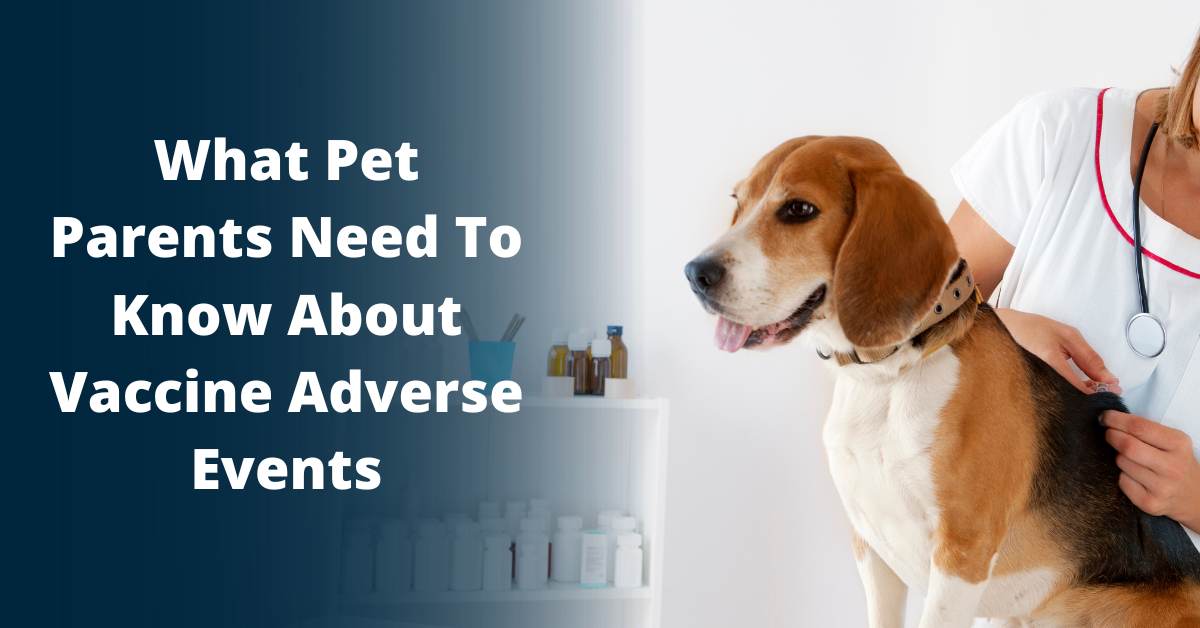Understanding Vaccine-Associated Adverse Events in Dogs: What Pet Parents Need to Know
We all know that vaccines are important to prevent infectious disease.
Unfortunately, we also know the down side of over-vaccination and the long term side effects.
Our Experience with Over Vaccination
We had dogs that had GI upset and fevers after vaccines.
We saw the bumps swell up on our dog's bodies after a vaccine and were told, "that is normal." We also had a dog that had cancer later at the injection site years after receiving her vaccines.
We saw the personality of one of our super sweet dogs change after she had too many rabies vaccines.
We also had a dog diagnosed with immune mediated granulomatous meningoencephalomyelitis (GME).
Our experiences from all 4 of our dogs who had vaccine reactions attest that concerns about the safety of vaccines and their potential side effects is a very real concern.
Two Studies By Dr. George Moore and His Team
Dr. George Moore, DVM, PhD, DACVPM, DACVIM and his team conducted two studies looking at adverse reactions reported within 3 days of a vaccine injection.
The first study was published in 2005 and the most recent study was published in July 2023.
The 2023 Canine Vaccine Adverse Reaction Study
The study, conducted over a five-year period, analyzed the health records of more than four million dogs who received vaccinations to identify risk factors associated with adverse events (AEs) reported within 3 days of vaccination.
What are Adverse Events (AEs)?
It is reported that adverse events (reactions from vaccines) are not common (less than 1% of dogs had a vaccine reaction when receiving a single vaccine).
In our personal experience, they were very common. All 4 of our dogs (100%) had a reaction to vaccines!
Adverse events following dog vaccination can range from mild and self-limiting to severe and life-threatening.
-
Injection Site Reactions: Redness, swelling, pain, or a lump at the injection site.
-
Lethargy: Some dogs may appear tired or lethargic for a day or two after vaccination.
-
Fever: Development of a slight fever as their immune system responds to the vaccine.
-
Allergic Reactions: In rare cases, dogs may experience an allergic reaction to a vaccine. Signs of an allergic reaction can include facial swelling, hives, difficulty breathing, vomiting, or diarrhea. Severe allergic reactions, known as anaphylaxis, are extremely rare but can be life-threatening.
-
Itchy Skin or Urticaria: Some dogs may experience itchiness, redness, or hives on their skin after vaccination. This is a mild reaction and typically resolves without treatment.
-
Gastrointestinal Upset: Mild gastrointestinal upset, such as vomiting or diarrhea, can occur in some dogs after vaccination.
-
Pain or Lameness: In some cases, dogs may experience transient joint pain or lameness after vaccination.
-
Facial Nerve Paralysis: A condition called "facial nerve paralysis" has been reported in some dogs after receiving certain intranasal vaccines. This condition can cause weakness or paralysis of the facial muscles but is typically reversible.
- More Serious Disease: Many holistic veterinarians believe immune mediated granulomatous meningoencephalomyelitis (GME) is in part triggered by vaccines along with other serious diseases like cancer.
In recent years, the American Veterinary Medical Association (AVMA) has provided more education on the need to report adverse reactions but in our personal experience, the adverse reactions were not reported by our veterinarian to a regulatory agency. Adverse reactions to animal vaccines can be reported to the adverse event to the USDA APHIS Center for Veterinary Biologics online or by calling 800-752-6255.
It's important to remember that vaccines do offer protection from devastating diseases but should be administered only on healthy dogs.
Key Study Findings Simplified
The scientific journal article from both 2005 and 2023 are pretty complex, so we've simplified the findings to make them easier to understand:
-
Small Dogs Are at Higher Risk: The study found that smaller dogs weighing less than 11 pounds (5 kg) had a higher risk of AEs following vaccinations.
-
Breed Matters: Different dog breeds showed varying rates of AEs. French Bulldogs, Dachshunds, and Boston Terriers had higher AE rates compared to other breeds. Golden Retrievers, Labrador Retrievers, and German Shepherd Dogs had lower AE rates.
-
Number of Vaccines: The risk of AEs increased with the number of vaccines administered at a single visit. The odds of an AE occurrence rose by about 25% with each additional vaccine, up to four vaccines.
-
Vaccine Type: The study found that certain vaccines had higher AE rates than others. Rabies vaccine had a higher association with moderate to severe reactions, while leptospirosis vaccine and Lyme vaccine were more linked to mild reactions.
-
Sex and Neuter Status: Female dogs, particularly spayed females, had a higher likelihood of experiencing AEs compared to intact males.
-
Age Matters: Younger dogs, especially those around 1 year of age, showed an increased risk of AEs, possibly related to booster vaccinations.
What Does The Vaccine Study Mean for Pet Parents?
This study provides valuable insights into vaccination safety for our pets.
While AEs are relatively rare, certain factors can influence their occurrence. As responsible pet parents, it is essential to:
-
Discuss Vaccination Plans: Work closely with your veterinarian to create a personalized vaccination plan for your pet, taking into account their breed, size, age, and medical history. We highly recommend the vaccination protocol developed by Dr. Jean Dodds. Single dose vaccinations (not the popular combination dose) should always be used.
-
Monitor Your Pet: Pay attention to your pet's health after vaccination. If you notice any concerning symptoms, contact your veterinarian immediately and follow up to make sure the AE is reported or report it yourself.
-
Consider Vaccine Schedule: If your pet is smaller, consider spreading out vaccinations over multiple visits to reduce the risk of AEs. Again, we highly recommend following the vaccination protocol developed by Dr. Jean Dodds.
Remember, vaccinations play a vital role in safeguarding your pet's health and preventing life-threatening diseases. By working with your veterinarian and understanding the risks, you can ensure the best care for your beloved furry friend.
References:
- Moore, George E et al. “Adverse events diagnosed within three days of vaccine administration in dogs.” Journal of the American Veterinary Medical Association vol. 227,7 (2005): 1102-8. doi:10.2460/javma.2005.227.1102, https://avmajournals.avma.org/view/journals/javma/227/7/javma.2005.227.1102.xml.
- Moore, George E et al. “Breed, smaller weight, and multiple injections are associated with increased adverse event reports within three days following canine vaccine administration.” Journal of the American Veterinary Medical Association, 1-7. 14 Jul. 2023, doi:10.2460/javma.23.03.0181, https://avmajournals.avma.org/view/journals/javma/aop/javma.23.03.0181/javma.23.03.0181.xml.
- Vaccination protocol developed by Dr. Jean Dodds.





